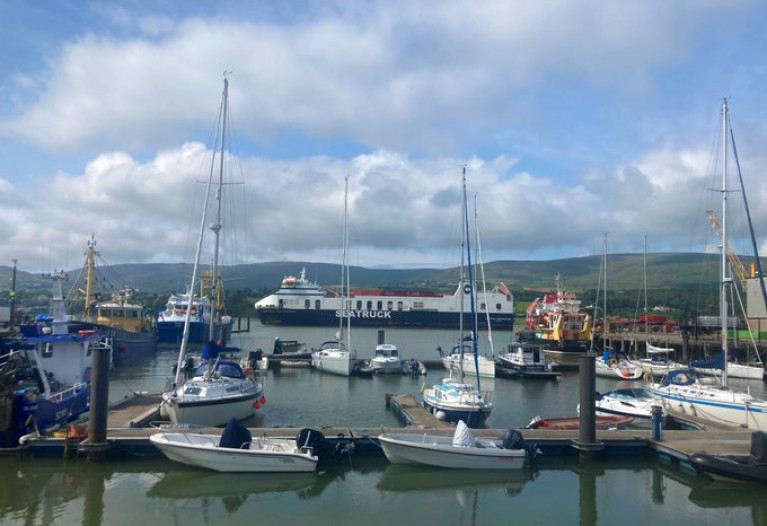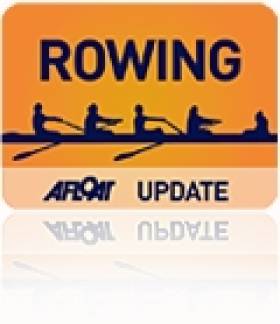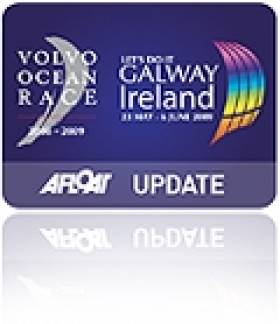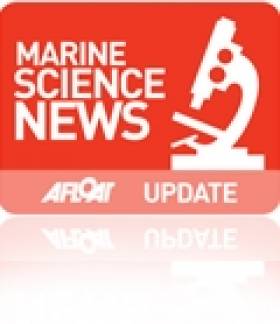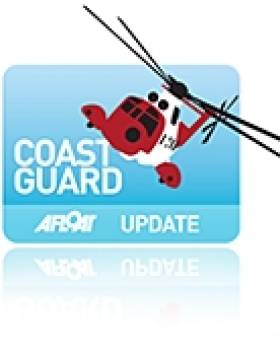Displaying items by tag: Minister
The appointment of two non-executive members to the board of Warrenpoint Harbour Authority (WHA) has been announced by Infrastructure Minister Nichola Mallon.
Minister Mallon said “I am pleased to announce a first term appointment for Fiona Hanna and a second term appointment for Richard Johnston.
“Warrenpoint Port has ambitious development plans which will provide support as it recovers from the pandemic and takes advantage new of opportunities, as well as supporting the local economy and providing opportunities for growth.
"The Port will also have a focus on working with stakeholders and partners in bringing forward important strategic projects such as the Narrow Water Bridge and the Southern Relief Road. I am confident that the experience Fiona and Richard bring, will be of considerable value to the Board in the years ahead”.
On 1 August, the appointments had come into effect and will be for a maximum of four years.
The appointments have been made in accordance with the Commissioner for Public Appointments for Northern Ireland’s Code of Practice.
Cork Boat Club Thrilled with Renovated Clubhouse
Cork Boat club in Blackrock Village, Cork has celebrated the completion of an 18-month programme of renovation of its clubhouse with a re-opening ceremony attended by club members and their families, as well as local public representatives.
As Afloat.ie reported previously, the works were funded by a 2014 grant of €100,000 from the government’s Sports Capital Programme, Cork City Council and club members.
Cork’s Lord Mayor Cllr. Chris O’Leary and Minister for Agriculture, Food, Marine and Defence Simon Coveney attended along with TDs Ciarán Lynch, Jerry Buttimer and Micheál Martin, Deirdre Clune MEP and Cllr Laura McGonigle and Cllr Des Cahill.
Three construction projects were completed: the ruin of Blackrock Coastguard Station, which dates from the 1840s, is part of the club’s grounds and a prominent landmark in Blackrock Village and was in imminent danger of collapse. Through collaboration with Cork City Council, the club rebuilt and restored the building in a sensitive manner, preserving its historical value. The roof of the large clubhouse designed by renowned Cork architect Frank Murphy was also replaced in its entirety and the club’s gym received a complete renovation with new windows, reconstructed walls and painting. Part of this work involved restoring windows on the eastern perimeter revealing views toward Blackrock Castle.
Minister Coveney officiated at the ceremony. He said:
"The transformation of Cork Boat Club in recent years has been remarkable. The extent of work done is a credit to the club and is a tremendous example of the direct impact that the government’s Sports Capital Programme is having in the community. The club has shown itself to be a leading light in terms of collaboration with local agencies and organizations as shown by their recent partnership with Cork City Council to save the iconic Blackrock Coastguard Station which was in imminent danger of collapse, their agreement this year with Christian Brothers College to augment the rowing programme at one of city’s leading secondary schools and their work with Port of Cork and Cork City Fire Brigade to allow access to the site for emergency search and recovery launching. I commend the club and its members for their work to date and encourage them to continue with their ambitious plans for the club, one of the most successful in the country.”
Minister Coveney cut a ribbon held between oars painted in the club colours, assisted by club stalwart Tom O’Riordan and the newest member of the Boat Club family, six-month-old Rory Judge Joyce. Rory’s parents, Fran Judge and Eamonn Joyce, both competed for club and country.
Impressive New Lough Rinn Course Opened
#ROWING: Minister of State Michael Ring yesterday opened the top-class new rowing and canoeing facility at Lough Rinn in Leitrim. The adjustable 2,000 metre course, which can be used for sprint canoeing and rowing, is of top intenational standard. According to Leitrim Tourism the investment so far has been €900,000. The next phase, if it is funded, would bring the associated facilities up to the standard where international events could be held at the course.
Deane Public Works of Enniskillen worked on the course with Polaritas of Hungary, whose systems were used in London 2012 and will be in Rio 2016.
Lough Rinn is very accessible from the North, South and East of Ireland. It has a number of major advantages, including dependable water levels, a 1,000 metre area at one end of the course where crews can warm up and cool down, and a north-south orientation, which should mean the course would rarely be adversely affected by windy conditions.
Marine Minister to Promote Irish Sailing at Volvo Ocean Race
Coveney will officiate at an International press and VIP breakfast in the Volvo race HQ this Friday before the nine month long race begins on Saturday.
The Government Minister, himself an avid racing sailor, will see the Discover Ireland backed entry, Team Sanya, compete against the five other entries in a 33,000 mile race round the world that finishes in Galway next July.
Ireland's two top offshore sailors are involved in the race but there is no Irish crew on the Discover Ireland backed boat. Kerry's Damian Foxall is a watch leader on Groupama, Wexford's Justin Slattery is bow man aon team Abu Dhabi.
Discover Ireland is putting up to 25% of the sponsorship for the Chinese Sanya entry.
Also attending Friday's breakfast event, as part of Galway's delegation, is Irish ambassador to Spain Justin Harman, the Mayor of Galway Hildegarde Naughton and Galway City Manager Joe O'Neill.
As part of the promotional build up a Galway Hooker is en route to the middle east in an unexpected cultural exchange between Ireland and the United Arab Emirates. The traditional Irish sailing boat is on the way to Abu Dhabi in an exchange that will also see six Arabian dhows in Galway for the finish of the race next summer.
'The Sea: One of Ireland's Greatest Natural Resources' - Coveney
The Minister was speaking during a visit to the Marine Institute's research vessel, RV Celtic Explorer, on its return from a mission to the Labrador and Newfoundland Seas.
He added "I am particularly pleased that this is my first official engagement as Minister for Agriculture, Marine and Food. The work of the RV Celtic Explorer highlights the essential nature of marine research, development and sustainable management, through which Ireland is developing a strong and well-deserved reputation as an emerging centre of excellence, where we have prominent roles in many European and international marine science bodies."
Minister Coveney commended the Marine Institute and its Chief Executive, Dr Peter Heffernan, for its leading and proactive role in the areas of fisheries science, marine environment and food safety as well as ocean science and said that he looked forward to working closely with the Institute and benefitting from the research and advice which they would undertake and provide.
The Minister noted that Ireland's two national research vessels – RV Celtic Explorer and RV Celtic Voyager – will record 267 days at sea during 2011, during which they will be engaged in fisheries surveys, underwater mapping, climate studies and deepwater surveys.
Speaking today, Minister for Transport Leo Varadkar TD said: This invitation to Achill Coast Guard Unit is an acknowledgement of the life-saving work that this Unit (and indeed all our Volunteer Units) around the country are engaged in every day of the year. Every day, these people selflessly risk their own lives to save others in all weathers, day and night, often in very dangerous conditions. This invitation is in recognition of their work and is an indication of the high esteem in which our Coast Guard Units are held internationally."
Achill Island Coast Guard Unit is made up of 24 volunteers who carry pagers and are available on 15 minutes' notice day and night 365 days a year. In August 2009 the Unit took part in a search and rescue operation for a person who fell into the Atlantic Ocean while fishing off the rocks near Achill Island. In response to this incident, the Achill Coast Guard rescue boat was launched together with local RNLI Ballyglass Unit and the Sligo Coast Guard helicopter during very hazardous weather conditions. The casualty (a Mr. Patrick Williamson) who amazingly stayed afloat swimming in high seas for over an hour was successfully rescued and spent 5 days in intensive care following his ordeal in the sea.
On making a full recovery, Mr. Williamson nominated Achill Island Coast Guard Unit for a National Courage Award. Previous recipients of this honour include the Irish Army (for peacekeeping duties) and former Taoiseach Mr. Bertie Ahern (for his involvement in the peace talks in Northern Ireland).
Director of the Irish Coast Guard, Mr. Chris Reynolds today said: "The Achill Coast Guard Unit is well-deserving of this honour and I congratulate them on being part of this special event. It is a great recognition of the standard and quality of service the Coast Guard provide and I thank Mr. Williamson along with all who helped make this happen for inviting them to take part in this special event."
Simon Coveney Appointed Marine Minister
Cork sailor Simon Coveney (38) has been appointed as Minister of Agriculture, Food and Marine in the new cabinet of the Fine Gael/Labour Government formed yesterday.
The announcement has been welcomed by various marine interests pleased to see Marine back at the cabinet for the first time since the Department was dismantled by Fianna Fail's Bertie Ahern in 2002.
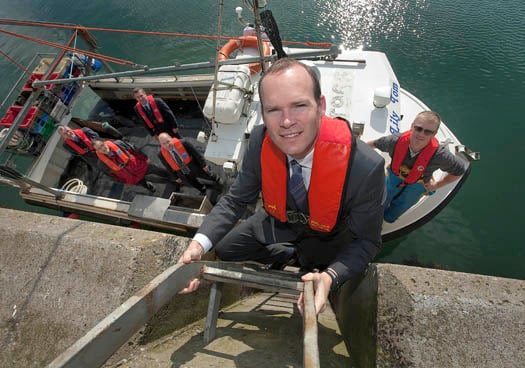
Marine Minister Simon Coveney TD
The appointment means Taoiseach Enda Kenny has kept good an election promise to reinstate the Marine department. A decade of lost opportunties has meant the sector has suffered through lack of infrastructure and coastline planning.
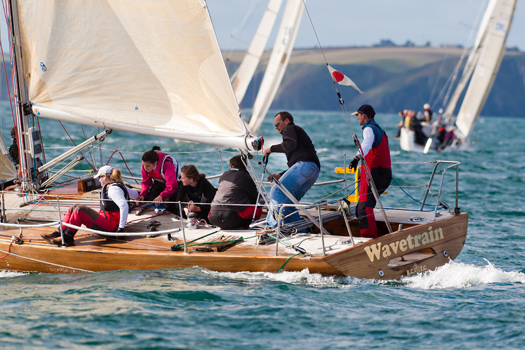
Simon Coveney at the helm of his yacht Wavetrain. Photo: Bob Bateman
"Simon is someone who understands the Sea as a sailor himself but also in his work as an MEP where he was involved in a number of major European maritime projects. This is a great opportuinty for the Marine. We look forward to working with him to develop this untapped resource." said David O'Brien of the Irish Marine Federation.
Simon was first elected to the Dáil in 1998 as one of Fine Gael's youngest TD's aged 26. He replaced his father Hugh Coveney TD following his untimely death.
Simon follows his father in to the post of Marine Minister. Hugh held the post in 1994.
Simon holds a B.Sc. in Agriculture and Land Management from Royal Agriculture College, Gloucestershire. He was also educated at Clongowes Wood College, County Kildare; University College Cork, and Gurteen Agricultural College, County Tipperary.
A keen fan of all competitive sport he has worked as a sailing instructor at his club Royal Cork Yacht Club in Crosshaven and been involved in many sailing regattas.
In 1997/8 he led the "Sail Chernobyl Project" which involved sailing a boat 30,000 miles around the world and raising €650,000 for charity.
In 2006 he contributed to RTE's series The Harbour and in a memorable quote, the Cork TD and former MEP said: "When somebody asks me the question, what's the one thing that's special about Cork?, I'd say the harbour."


























